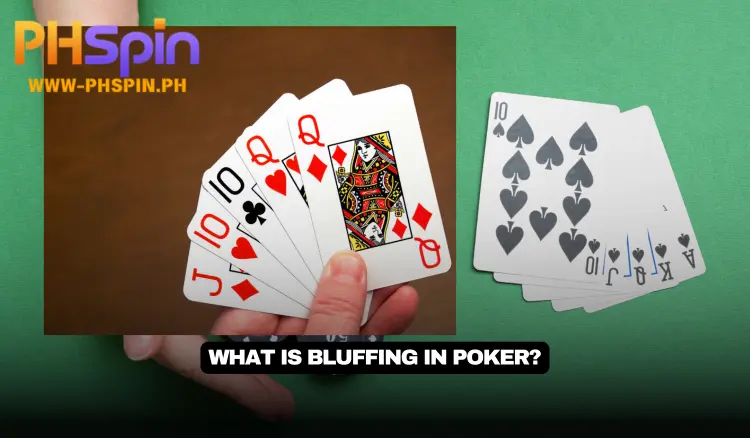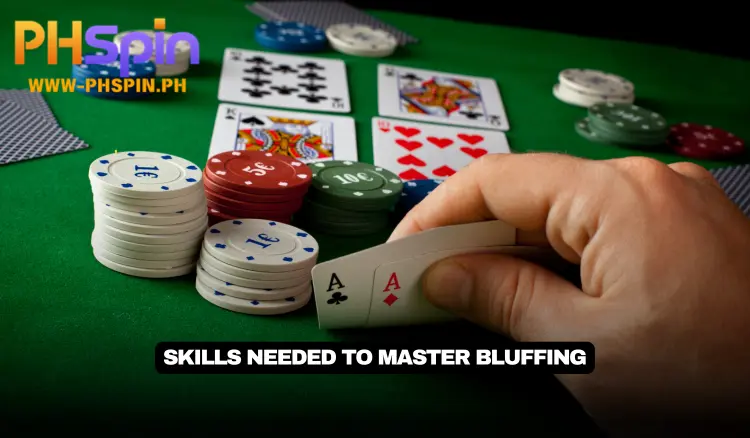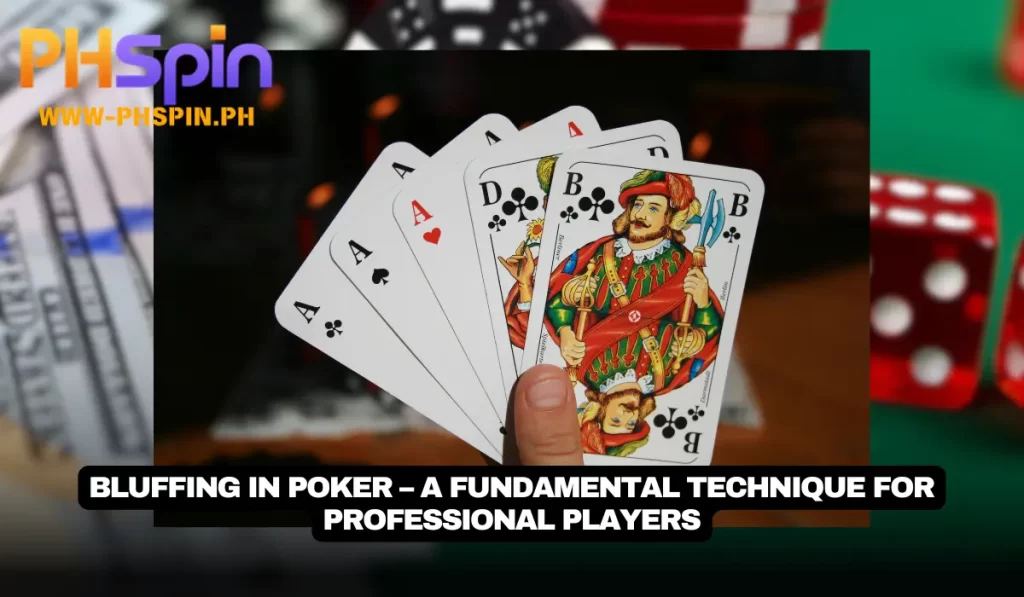Bluffing in poker has captured special attention from the media, with TV often showcasing dramatic bluffs and players securing impressive wins at the World Series of Poker (WSOP). It’s not just on the small screen; movies also portray the skill of deceiving opponents, adding to the thrill of the game. In this guide, PHSPIN will provide some essential tips on how to execute bluffs in poker, a fascinating aspect of the game.
What is Bluffing in Poker?
In the language of poker, bluffing is a sophisticated art—a clever technique used to deceive opponents and gain an advantage during the game. The concept involves convincing your opponents that you have a strong hand, pushing them to fold after you place a significant bet or raise. In reality, only players with weak hole cards usually resort to bluffing, creating pressure to persuade their opponents to fold. However, it’s worth noting that bluffing can also bring surprise and strategic advantage to the game.

When you enter a poker hand, if your cards are weak or risky, consider whether your opponents might be facing a similar situation. In such cases, maintaining calmness and assessing the possibility of forcing them to fold can be smart. Bluffing in Poker becomes a strategic move to deceive opponents and secure victory in these situations.
The Fascination of Bluffing
One of the most exciting aspects of bluffing in poker is how frequently players use it. For beginners or casual players, bluffing is often the key to winning in poker. However, this is only partially true. In poker, victory doesn’t necessarily rely on bluffing (though it’s important to understand that overusing bluffing is not advisable).
The frequency of bluffing in Poker among casual players is usually inconsistent and varies based on skill, experience, and individual playing style. Some casual players may bluff frequently without much thought, while others may hesitate and use bluffs sparingly.
Amateur players often need a deeper understanding of how to read opponents and calculate the success probability of a bluff. They tend to use bluffing when they lack confidence in their hands or simply want to confuse their opponents.
In contrast, the frequency of bluffing among professional players depends on several factors, such as their personal playing style, the current situation on the table, and the types of opponents they face. Pros use bluffing strategically and with careful consideration.
They understand that bluffing too often can lead to significant losses and erode their opponents’ trust. Instead, they bluff in suitable situations, using the information available and sensing when their opponents are likely to fold.
Skills Needed to Master Bluffing

Professional players are skilled at reading and interpreting their opponents’ behavior and gestures to determine the right moment for a bluff. They can assess the strength of their own hand and calculate the success probability of a bluff.
A crucial point to remember is that you shouldn’t enter a hand with the sole intention of bluffing. Bluffs should only be made when you’re confident that you can win the pot based on how your opponents are acting during the betting rounds.
Does bluffing always lead to losing money? Not necessarily. Experienced players can time their bluffs carefully, securing pots that others have given up on, thereby increasing their chip stack. However, for beginners or even intermediate players, choosing the right moment to bluff takes work. It requires experience, situational awareness, and knowledge of your opponents to recognize when a bluff will succeed.
If you’re not confident that you can win a pot through bluffing, then it’s best not to attempt it.
Advantages of Bluffing in Poker
When you play poker more frequently, you’ll gradually understand the right moments to bluff. However, the benefits of bluffing extend beyond merely winning a pot.
- Building a Loose Image: Regularly executing successful bluffs can help you establish a “loose” image as a player who frequently plays with weak hands. This can cause your opponents to second-guess and hesitate when you bet, opening up opportunities for you to make larger bets or raises when you actually have a strong hand.
- Causing Opponents to Tilt: If you successfully bluff and your opponents catch on, they might become frustrated and lose control over their decisions. They may play recklessly in an attempt to recover their losses. This mental state, known as “tilt,” can increase your chances of winning, as opponents lose focus and make mistakes.
- Creating Surprise: When you bluff in the right situations, you introduce an element of surprise to the game. This can disrupt your opponents’ focus and make your actions unpredictable. If you defeat them with a well-timed bluff, they may be astonished and gradually lose confidence in reading your moves.
- Controlling the Pot: Bluffing also helps you control the size of the pot. Instead of relying solely on strong hands to bet, you can create larger pots by bluffing and putting your opponents in difficult situations where they have to make tough decisions involving significant amounts of money.
=> Read more: Preflop Strategy in Poker at Phspin you must know.
Conditions for Bluffing Successfully in Poker
As you gain more experience playing poker, you’ll understand the nuances of bluffing and its benefits more clearly. Here are some essential conditions to consider when attempting a bluff:
- Understand Your Opponents: The more you know about your opponents’ tendencies and betting patterns, the easier it will be to identify opportunities for successful bluffs.
- Assess the Situation: Consider the current context of the game, including your position, the strength of your hand, and the actions of the other players.
- Choose the Right Timing: Bluffing in Poker should be done selectively in situations where it’s likely to succeed based on your knowledge of the game and your opponents.
- Manage Your Table Image: A player perceived as overly aggressive may find their bluffs called more frequently. Conversely, a tight player who rarely bluffs may succeed more often when they do attempt one.
=> Are you looking for a reputable and top-quality casino for betting? Try our partners: SUPERPH Casino.
The Bottom line
Bluffing in poker is a vital skill that every player needs to master. However, it is not the sole factor in winning the game. Bluffs should be executed in the right situations, with players needing to read their opponents, calculate probabilities, and plan their strategies carefully. Using bluffs can lead to gains and damage your credibility among opponents. Thus, it’s crucial to consider every bluff carefully, relying on information and insights specific to each hand.
Bluffing in Poker is an art that, when mastered, can significantly enhance your poker game.
=> Read more: Legal Status of Online Poker Sites in the Philippines.

